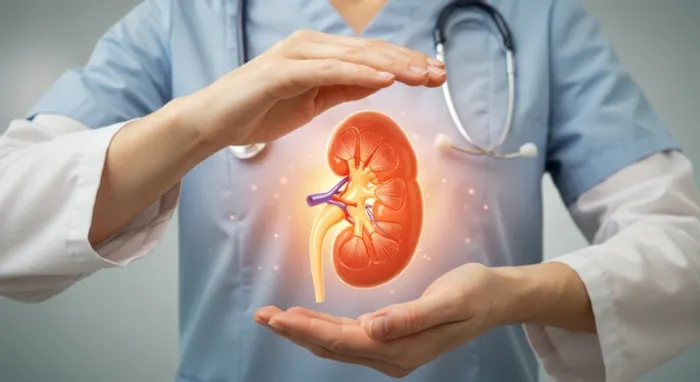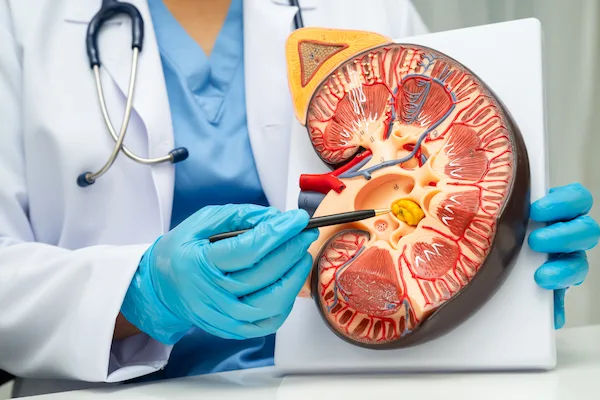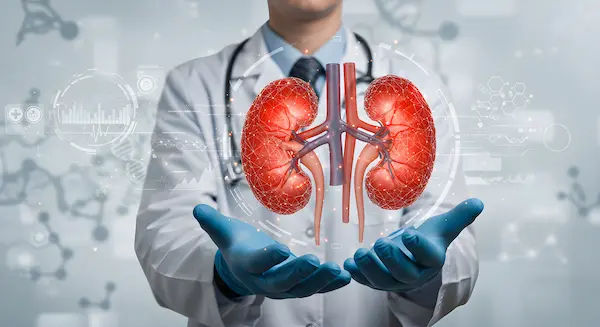Monsoon Care: Liver and Kidney Tests for Water-Related Infections
Stay healthy this monsoon. Learn which tests detect waterborne infections and how Apollo 24|7 makes seasonal health checkups safe and convenient.

Written by Dr. Rohinipriyanka Pondugula
Reviewed by Dr. Siri Nallapu MBBS
Last updated on 9th Sep, 2025

Monsoon season brings cooler weather and a break from summer heat, but it also increases the risk of infections. Waterborne diseases, mosquito-borne illnesses, and seasonal fevers become more common due to stagnant water, poor sanitation, and high humidity.
A health checkup during this time helps detect infections early, monitor vital organs like the liver and kidneys, and guide timely treatment. This article explores how monsoon-related health risks affect your body, which tests are most useful, and how platforms like Apollo 24|7 make seasonal diagnostics simple and accessible.
Common Monsoon Illnesses Detected by Blood Tests
The monsoon season increases the risk of several infections due to stagnant water, poor sanitation, and high humidity. Many of these illnesses can be detected through blood tests, allowing for timely treatment and preventing complications.
Here are some prevalent monsoon illnesses that targeted blood tests can help identify:
1. Dengue
- Cause: Aedes aegypti mosquito
- Symptoms: High fever, body pain, rash, low platelet count
- Tests:
NS1 Antigen Test (early detection)
Dengue IgM/IgG Antibody Test
Complete Blood Count (CBC) to monitor platelets and white blood cells
2. Malaria
- Cause: Plasmodium parasite via Anopheles mosquito
- Symptoms: Cyclical fever, chills, sweating, fatigue
- Tests:
Peripheral Blood Smear (microscopic detection)
Rapid Diagnostic Test (RDT) for malaria antigens
3. Typhoid
- Cause: Salmonella typhi bacteria from contaminated food or water
- Symptoms: Persistent fever, abdominal pain, weakness
- Tests:
Blood Culture (gold standard)
Widal Test
Typhi IgM/IgG Rapid Test
4. Chikungunya
- Cause: Aedes mosquito
- Symptoms: High fever, severe joint pain, rash
- Tests:
IgM Antibody Test
PCR Test for viral RNA
5. Leptospirosis
- Cause: Bacteria from contaminated water or animal urine
- Symptoms: Fever, muscle pain, red eyes, vomiting
- Tests:
IgM ELISA Test
PCR Test for Leptospira DNA
Kidney Function Tests (if renal involvement is suspected)
6. Hepatitis A
- Cause: Hepatitis A virus via contaminated food or water
- Symptoms: Fatigue, nausea, jaundice
- Tests:
IgM Antibody Test
Liver Function Tests (LFTs)
7. Gastrointestinal Infections
- Cause: Contaminated food and water
- Symptoms: Diarrhoea, vomiting, abdominal cramps
- Tests:
CBC
Stool culture (often paired with blood tests for systemic signs)
Essential Panels: Liver, Dengue, Typhoid, and Kidney Test
Monsoon season increases the risk of waterborne and vector-borne infections, many of which can silently affect vital organs like the liver and kidneys. If you're considering a seasonal test package, make sure it includes these critical panels:
1. Liver Function Test (LFT)
Contaminated food or drinks can put immense stress on your liver. Viral infections like Hepatitis A and E, or prolonged medication use, can also disrupt liver enzyme levels. The LFT checks for:
- Bilirubin levels (to detect jaundice and bile metabolism issues)
- Liver enzymes such as SGOT and SGPT
- Protein synthesis and detox efficiency, including albumin and globulin levels
This test is especially important during the monsoon because liver-related symptoms like nausea, yellowing of the eyes, or general weakness may not appear until the liver is already under stress. Detecting any changes early helps in prompt dietary and medicinal interventions.
2. Dengue Profile (IgG, IgM, and NS1 Antigen)
Dengue fever spreads rapidly during the monsoon and can turn severe very quickly. Its symptoms, such as high fever, body pain, and headaches, can worsen without proper monitoring. The dengue profile includes:
- NS1 antigen (for early-stage detection before antibodies are formed)
- IgM and IgG antibodies (for identifying active or past dengue infections)
The combined use of antigen and antibody testing provides a more complete picture, helping your doctor decide whether you need hospitalisation or can recover at home. It also helps rule out reinfections or secondary dengue, which are more dangerous.
3. Typhoid IgG and IgM
Typhoid often mimics flu or gastro symptoms, especially in its early stages. This blood test helps distinguish typhoid from other fevers and digestive illnesses by checking for:
- IgM antibodies (indicate a recent or ongoing infection)
- IgG antibodies (show prior exposure or a chronic carrier state)
It is particularly useful if you’ve been eating outside food or exposed to unfiltered water. Typhoid, if untreated, can lead to intestinal complications, so a clear diagnosis is essential.
Book Typhidot IgG and IgM Test now
4. Kidney Function Test (RFT/KFT)
Leptospirosis and dehydration are common during monsoon and can impact your kidney health silently. This panel evaluates:
- Urea, creatinine, and uric acid
- Electrolyte balance, including sodium and potassium
- Glomerular filtration efficiency to assess how well your kidneys are working
When your kidneys are underperforming, symptoms might be as vague as bloating, puffiness, or reduced urination. Early testing prevents the condition from worsening, especially if you’ve had fever, used strong antibiotics, or have a pre-existing health condition.
When to Get a Monsoon Health Checkup: Practical Guidance
Monsoon health checkups are most useful when guided by symptoms, personal health history, and environmental exposure, not done routinely for everyone. Here's how to decide when testing is appropriate:
When Testing Is Recommended
You should consider a health checkup if you experience:
- Fever lasting more than 2–3 days
- Unexplained fatigue, weakness, or body aches
- Yellowing of eyes or skin (possible liver stress)
- Persistent vomiting, diarrhoea, or abdominal pain
- Joint pain, rash, or signs of dehydration
These symptoms may indicate infections like dengue, typhoid, hepatitis A, or leptospirosis, which are common during monsoon and require timely diagnosis.
Get These Tests To Get A Yourself Checked up
When Preventive Testing Is Useful
Preventive testing may be helpful if:
- You live in flood-prone or mosquito-heavy areas
- You’ve recently recovered from a seasonal illness and want to monitor organ recovery
- You have elderly family members, young children, or someone with a chronic illness at home
- You’re planning travel or outdoor activities that increase exposure
In such cases, basic panels like liver and kidney function tests, complete blood count (CBC), and dengue or typhoid screening may offer peace of mind.
What’s Practical
- Test when symptoms or risk factors are present
- Avoid unnecessary testing if you're healthy and not exposed
- Consult a doctor to choose relevant tests based on your situation
How to Stay Safe with Home Sample Collection During Monsoon
Stepping out during the rainy season can be inconvenient and risky, especially when you're unwell or caring for vulnerable family members. Apollo 24|7 offers a safe and hygienic home sample collection service, allowing you to get tested without leaving your home.
How It Works
- Book your test online through the Apollo 24|7 app or website.
- Choose a time slot that suits your schedule.
- A trained phlebotomist will visit your home using clean, sanitised equipment and following safety protocols.
- Samples are collected safely, and reports are delivered digitally within hours.
Why It’s Beneficial
- Avoids exposure to rain, traffic, and crowded diagnostic centres with sick individuals.
- Ideal for elderly individuals, pregnant women, recovering patients, or those living alone.
- Digital reports are securely stored, easy to access, and can be instantly shared with doctors for consultation.
Home collection is a practical way to stay on top of your health during monsoon, without added stress or inconvenience.
Book Water-Borne Illness Tests on Apollo 24|7
Apollo 24|7 offers a range of diagnostic panels specifically curated to detect common waterborne infections that are more prevalent during the monsoon season. These tests help identify early signs of illnesses caused by contaminated water and support timely treatment.
Key Tests for Monsoon-Related Infections:
- Typhoid Panel: Includes Widal test and Typhi IgM/IgG to diagnose typhoid fever.
- Hepatitis A and E Testing: IgM antibody tests and LFT tests to assess viral hepatitis, which is often transmitted through unsafe drinking water.
- Leptospirosis: IgM, ELISA and PCR to detect this bacterial infection commonly spread by floodwater.
- Kidney Function Test (KFT/RFT): Measures creatinine, urea, and electrolytes to monitor kidney stress from infections like leptospirosis or severe dehydration.
- Liver Function Test (LFT): Evaluates enzymes like ALT, AST, bilirubin, and albumin to assess liver inflammation or damage due to infections.
- Complete Blood Count (CBC): Checks white blood cells, haemoglobin, and platelets to assess immune response and infection severity.
Why Book on Apollo 24|7:
- Flexible Scheduling: Choose a date and time that fits your routine, with early morning and evening slots available.
- Home Sample Collection: Trained phlebotomists collect your sample at home or office, saving you time and effort.
- Quick Digital Reports: Access your test results securely via the Apollo 24|7 app or website, typically within 24 to 48 hours.
- Trusted Lab Standards: Tests are conducted in NABL-accredited labs to ensure accurate and reliable diagnostics.
For current pricing and package details, visit the Apollo 24|7 Lab Tests page or check the Apollo 24|7 mobile app.
Conclusion
Monsoon season brings a rise in infections, but not everyone needs to get tested before symptoms appear. The practical approach is to seek testing when you notice signs like persistent fever, fatigue, stomach discomfort, or changes in liver or kidney function. These symptoms may point to seasonal illnesses such as dengue, typhoid, or hepatitis.
Preventive testing can be helpful for people in high-risk areas, those recovering from recent illness, or individuals with vulnerable family members. For most others, symptom-based testing is sufficient. Monsoon health checkups are most effective when guided by your personal health needs and environment.






